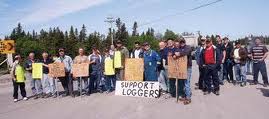 The Wise Use Movement has sought grass roots support through enrolling thousands of disaffected people in the US, particularly from rural areas in the West of the US, who are worried about their future, who feel individually powerless to do anything about it and who are ready to blame environmentalism for their woes.
The Wise Use Movement has sought grass roots support through enrolling thousands of disaffected people in the US, particularly from rural areas in the West of the US, who are worried about their future, who feel individually powerless to do anything about it and who are ready to blame environmentalism for their woes.
Wise use groups have successfully attracted rural workers to their groups by arguing that environmental protection costs jobs, threatens their land and environmentalists care more about animals and plants than people: “When jobs are lost to protect some tadpole, environmentalists have gone too far.”
 The movement draws membership from people who are pro-development, anti-big government, opposed to environmentalists, or just plain worried about their future economic prospects. Many people in rural USA are suffering the effects of economic recession and are only too willing to blame environmental protection measures. It provides them with a focus for their fears.
The movement draws membership from people who are pro-development, anti-big government, opposed to environmentalists, or just plain worried about their future economic prospects. Many people in rural USA are suffering the effects of economic recession and are only too willing to blame environmental protection measures. It provides them with a focus for their fears.
The wise-use movement regards wilderness, wetlands and endangered species as the unholy trinity responsible for most of its gut worries—from the loss of timber jobs in the Pacific Northwest to the locking up of public and private lands to protect plant and animal species.
The leaders of the Wise Use Movement and their corporate allies have exploited the fears and suffering of workers and rural citizens. Arnold and Gottlieb generate opposition to environmentalists by blaming them for economic problems in the US: “Increasing out-of-pocket cost of regulation to the average American is not the only way environmentalists trash the economy. Preventing economic growth—lost opportunity costs—is another way to bring about industrial collapse,” they claim. “Every time an environmental group draws a line around a new place on a map and convinces Congress to ‘protect’ it, thousands of people are pushed out of productive employment.”
The anti-environmental, deregulatory, property rights rhetoric of the Wise Use Movement is “designed to transform the real anger and anxiety over the changing economic conditions of the West into a forceful political movement” that can be utilised by conservative interests. It is powerful because many rank and file Wise Use members are angrier and more motivated than the supporters of environmental groups since they are fighting for their self-interest and their economic well-being.
The wise use leadership doesn’t seem to have any genuine concern for worker’s issues. Gottlieb reflects on his 1984 decision to team up with Arnold and build a movement:
It worked out far better than I would have predicted. I’ve never seen anything pay out as quickly as this whole Wise Use thing has done. What’s really good about it is it touches the same kind of anger as the gun stuff, and not only generates a higher rate of return but also a higher average dollar donation. My gun stuff runs about $18. The Wise Use stuff breaks $40.
The irony is that most of the major corporate financiers of the movement are not supporting it so as to protect workers jobs and have themselves been a major cause of job losses. Thousands of jobs have already been lost from the timber industry in the US and Canada through automation, economic rationalisation and export of raw logs.
Yet none of these groups blame the corporations for the job losses because they have been provided with a convenient scapegoat—environmental protection and environmentalism: “A decade of low timber demand, of low prices, of lay-offs and closures could now be fairly and squarely blamed on environmentalists.” William Street, the director of research for Woodworkers of American explains:
Once you have folks that are scared, then you have folks that are receptive or vulnerable to any kind of solution. At that point, the wise-use groups speak to the woodworkers’ fears better than most of the locally based and certainly better than the nationally based environmental groups.
The corporate supporters of the movement have nothing to boast of when it comes to labour policies. But they do have an interest in driving a wedge between environmentalists and workers. When reporting about Wise Use groups in Canada, a Canadian Government Report said that:
the forest companies have provided these ‘local citizens coalitions’ with much of the organizational impetus and financial backing. Their apparent objective has been to put labor against environmentalists and environmentally oriented persons. Their effect has been to divide communities and create animosity in the very places where honest communication and consensus should be encouraged.